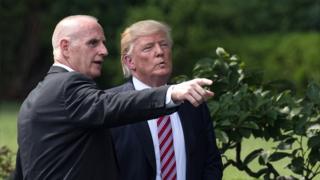 Image caption Ex-Director of Oval Office Operations Keith Schiller (left) and President Donald Trump - Mr Schiller was one of those involved in the medical records 'raid' according to Dr Harold Bornstein
Image caption Ex-Director of Oval Office Operations Keith Schiller (left) and President Donald Trump - Mr Schiller was one of those involved in the medical records 'raid' according to Dr Harold BornsteinUS President Donald Trump's personal doctor Dr Harold Bornstein has claimed Mr Trump wrote his own letter of health during the election and later sent aides to 'raid' the physician's office. Dr Bornstein now says he fell out of favour with the president after divulging some of Mr Trump's prescriptions to US media.
The BBC spoke to a US medical ethics expert to detail three of the ethical concerns brought up by these allegations around the president's healthcare.
1. Dr Bornstein divulged information about Mr Trump's prescriptions
The New York Times, which first interviewed Dr Bornstein about Mr Trump's health last year, said the doctor willingly volunteered facts about Mr Trump's health.
He told the Times that Mr Trump took Propecia as a treatment for male baldness, a common antibiotic for rosacea, a statin for his cholesterol levels, and a daily aspirin.
In the US, medical records and related medical information are protected under a privacy law known as the Health Insurance Portability and Accountability Act (HIPAA).
The law states that the only people who can see a patient's medical information without explicit permission are the medical staff involved with treatment and those processing the patient's bills.
Dr Arthur Caplan, professor of bioethics at New York University, said that Dr Bornstein could have violated HIPAA, a federal law, by sharing details about Mr Trump's prescriptions.
"It has big penalties," Dr Caplan added. "Five years in jail, a $50,000 fine. Trump's doctor said these drugs are trivial, [but] it's not on the doctor to decide that."
2. Dr Bornstein now claims Mr Trump wrote his own letter of health
In a recent CNN interview, Dr Bornstein said a 2015 letter suggesting that Mr Trump would be the "healthiest individual ever elected to the presidency" was not his professional assessment.
Dr Bornstein said that Mr Trump "dictated the letter" to him.
"It raises the issues that, as with any celebrity, it's dangerous to ask their doctor to evaluate them," Dr Caplan told the BBC. He added that to him, the letter "doesn't look like anything a doctor would write".
"Celebrities and powerful people tend to use people that will do what they want, so ethically, it's always a conflict of interest. You shouldn't expect an honest answer."
In light of these allegations, Dr Caplan said he believes the US needs a new system for examining presidential candidates.
Using an independent board of doctors rather than just the candidate's personal physician, he said, would help address these ethical issues.
3. Dr Bornstein alleges his medical office was 'raided' for the president's medical records
The New York City-based physician told NBC News he was visited by one of Mr Trump's personal bodyguards, whom he identified as Keith Schiller, and two other men at his office on 3 February 2017.
Dr Bornstein said the president's aides took the original and only copy of Mr Trump's medical records, including lab reports.
While the White House has insisted the incident was not a raid, and was just "standard procedure," Dr Caplan told the BBC it is a doctor's right to keep a copy of patient medical records.
"In the US, medical records are joint property," Dr Caplan said. "They do belong to the patient who can have a copy, but the doctor keeps one too because if an issue comes up about malpractice, they have to have the record. You can't just come in and take away everything."
Dr Caplan noted that because Mr Trump's aides did not provide a letter from Mr Trump himself requesting the information, their taking possession would be illegal.
"You can't have a president sending people out to pull records - it's an abuse of power," Dr Caplan said. "It hasn't gotten the backlash in the States that it should."
"Trump's personal doctor acted very unprofessionally," Dr Caplan added. "And we still don't know if Trump is healthy or not."

No comments:
Post a Comment